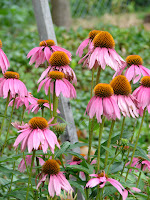Power of Art
Last night's episode was on Rothko. Jebbo and I went to the Rothko chapel while I was in Houston and spent quite a bit of time in the Rothko room in the neighboring museum containing the Menil Collection.
They tend to replay these episodes here on Georgia Public Television, but check your local listings. I thought the Rothko episode was particularly good -- maybe because I had just seen several paintings and had a nice conversation with Jebbo about them.
Anyway, what I like about Rothko's paintings is similar to what I like about Morrison's books or about the ballet that I saw in NYC: when I read or see it, I feel something. What I feel is different for each piece (or even each chapter), but there is a literal emotion that I feel when I experience those artists.
It is the human experience: to connect with other human beings. And to travel across distance, time periods, genders, cultures, sexualities, classes, races, nationalities, or whatever other boundaries exist out there, that is the "it" factor.
The co-Potter-enthusiast wants a happy post today. I'm skeptical. Today, it seems that what moves me in life is not happy. It is not the perfect ending to book 7 that I liked, but the earlier chapter where he dies: standing fully conscious of his own sacrifice to face death -- even though he is scared.
This is what this episode of Power of Art showed me about Rothko. As a Russian, Jewish immigrant, Rothko watched as the Holocaust and the atom bomb destroyed the world as it was known. I never lived in that world. I don't know a place where people believe in god or good or truth. My world, though, however destroyed and tainted, still contains something that connects person to person. And even if that truth is relative, it is a sort of truth after all.
This "it" somehow brings me back to The Road by Cormac McCarthy, and the idea that even when all is lost, all is not lost.
So perhaps this is a happy post after all.

















